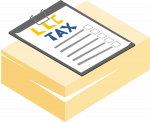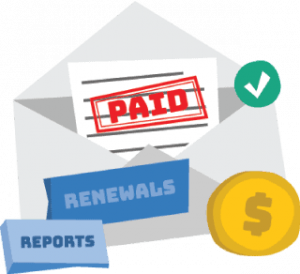Pennsylvania LLC Taxes
Pennsylvania LLCs are taxed as pass-through entities by default. That means the business itself does not pay taxes. Instead, the LLC passes its revenue and losses on to its members. Members then pay the state’s personal income tax rate of 3.07% and are taxed at the 15.3% federal self-employment tax rate (12.4% for social security and 2.9% for Medicare). For LLCs that have C-corp tax election, they’ll have to pay the state’s corporate net income tax rate of 9.99%. Here’s what you need to know about Pennsylvania LLC taxes.
In this article, we’ll cover:


How Are Pennsylvania LLCs Taxed?
Single-member LLCs (SMLLC) are taxed as sole proprietorships, sometimes referred to as disregarded entities, by default. LLCs that have two or more members are considered multi-member LLCs and are taxed as partnerships by default. All LLCs in Pennsylvania, except for SMLLC, are subject to Pennsylvania’s corporate net income tax rate of 9.99%. The forms you’ll need to file are:
- Single-member LLC—Form 1040 (usually Schedule C, but some SMLLCs file C-EZ, E, or F)
- Multi-member LLC—Form 1065
- Pennsylvania S-Corps and Partnerships—Form PA-20S
As the owner of your LLC, you can elect S-corp or C-corp tax status if filing as a corporation is more beneficial to you and your business’s future. Here’s what that means for your Pennsylvania LLC:
Pennsylvania LLCs taxed as S-corp
In Pennsylvania, S-corps pay the corporate net income tax rate of 9.99% only up to the business’s built-in-gains. Shareholders or members of an LLC taxed as an S-corp pay the personal income tax rate of 3.07% on their shares of income, loss, and credit. S-corp status is a federal tax election available to both corporations and LLCs who meet the IRS requirements. Though you will have to pay the state corporate income tax, you won’t pay the federal corporate income tax.
File Form 2553 with the IRS to apply to have your LLC taxed as an S-corp. Once approved, you’ll file Form 1120-S to report your income to the IRS. Consult with a CPA to see if changing your LLC’s tax election is a good move for your business.
LLCs taxed as C-corp
Though it is not common, you have the option of having your LLC taxed as a C-corp, which is the default tax status for corporations. Filing as a C-corp makes you more attractive to investors because C-corps allow more flexibility in investing and transferring shares. C-corps are subject to double taxation by paying at both the corporate level and the shareholder level, but you are able to take more tax deductions. To file your taxes with the IRS as a C-corp, you’ll need to submit Form 1120.

Pennsylvania State Income Tax
If your LLC files as a partnership or S-corp, you’ll be required to pay Pennsylvania’s corporate net income tax, which is levied at a rate of 9.99%. You will file using Form PA-20S. Single member LLCs, only have to pay the state’s personal income tax, which is 3.07%.
If your LLC is filing as a C-corp, you pay Pennsylvania’s 9.99% corporate net income tax rate and the state’s corporate loans tax, which is 4 mill on each dollar. A mill is how Pennsylvania calculates property taxes. One mill is equal to $1 of property tax for every $1,000 in assessed value. You may have to pay more corporate state income taxes like gross receipts tax if your company is a utility or transportation business.
Check the Pennsylvania Department of Revenue’s corporate tax page for more information.

Sales and Use Tax
In Pennsylvania, the sales tax rate is 6% and is imposed on the rental, sale, or use of personal or digital property and products in Pennsylvania, also called the Commonwealth. Pennsylvania also levies a use tax at the same 6% rate for people who buy taxable goods or services. On both the sales and use tax rates, you’ll need to add 1% local tax for products and services bought, delivered, or used in Allegheny County and 2% for Philadelphia. You will also need to get a Sales Tax License or “seller’s permit” if you own a place of business in the Commonwealth.

Local Pennsylvania Taxes
Pennsylvania has a maximum local sales tax rate of 2%, but many towns and cities don’t have a sales and use tax. You will have to pay local employer taxes called the local Earned Income Tax and Local Services Tax. These taxes will vary depending on location. For example, in Gettysburg, the Local Services Tax is $52 a year and the Earned Income Tax is 1.7% of gross wages and net profits.

Other Taxes in Pennsylvania
Your LLC may also encounter industry-based or employee-related taxes in Pennsylvania.
Pennsylvania State Employer Taxes
If you employ workers, you’ll need to pay unemployment insurance, obtain workers’ compensation coverage, and pay the Earned Income Tax and Local Services Tax.
- Unemployment (UI) Tax—Pennsylvania requires all employers to register for the unemployment compensation insurance tax. This tax is paid to help employees when they suffer a job loss due to no fault of their own. Your rate is based on how long you’ve been employing workers.
- Workers’ Compensation—Workers’ compensation insurance is required by law in Pennsylvania, but some employers are exempt, and you don’t have to insure independent contractors. You can be covered by a private insurer or go through the Pennsylvania State Workers’ Insurance Fund. You may also self-insure with approval from the state. Your rates will depend on many factors, including industry, number of workers, and location.
- Earned Income Tax and Local Services Tax—If you have a work site within Pennsylvania, you are required to withhold both local Earned Income Tax and Local Services Tax on behalf of your employees. Your rates for both of these taxes are based on your location. For example, in Erie, the Earned Income Tax rate is 1.18% and the Local Services Tax is $52 per year. You’ll need to check with your local municipality for rates and fees.
To learn more about Pennsylvania employer taxes, visit the Pennsylvania Office of Unemployment Compensation and Pennsylvania Department of Labor & Industry websites.
Industry Taxes
The Pennsylvania Department of Revenue levies a tax on certain industries, including:
- Cigarette Tax
- Hotel Occupancy Tax
- Motor and Alternative Fuel Taxes
- Malt Beverage and Liquor Tax
- Wine Excise Tax

Do foreign LLCs in Pennsylvania need to pay Pennsylvania taxes?
Yes. Pennsylvania foreign LLCs have to pay the same taxes as domestic LLCs. Foreign LLCs are subject to Pennsylvania’s corporate net income tax of 9.99%. You won’t have to pay this tax if your only business is limited to the solicitation of sales of tangible personal property within the state. On top of the state’s corporate net income tax, you will also have to pay foreign franchise taxes. Your LLC is a foreign LLC if it was formed in another state and registered with the Pennsylvania Secretary of State to do business in the state.





